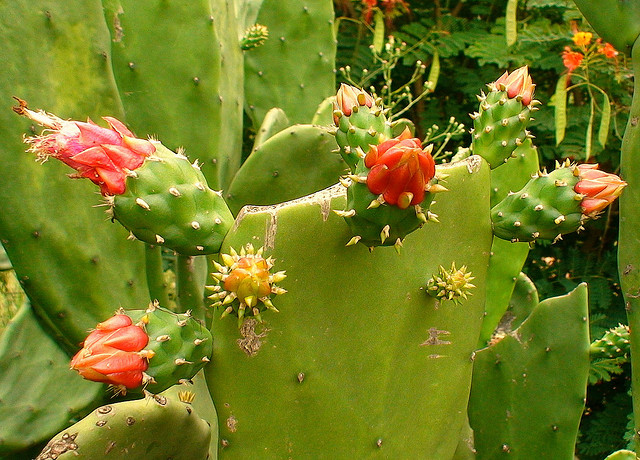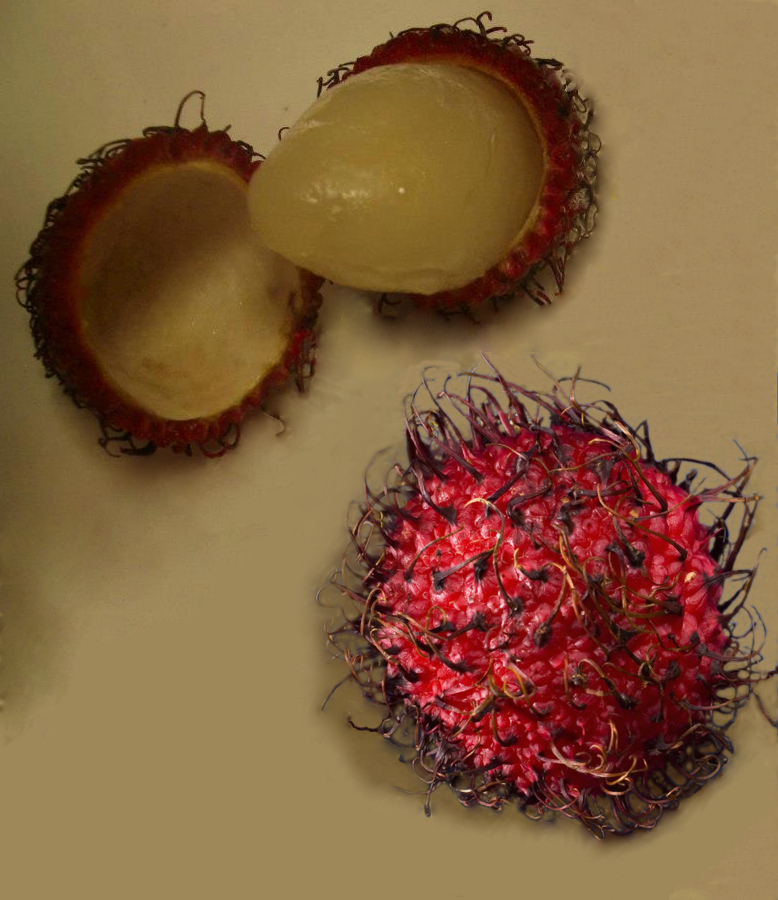rab·bit·brush (ra´bit brəsh´) or rab·bit·bush (ra´bit bu̇sh´) n. a perennial upright shrub of southwest North America (Ericameria nauseosa (Pall. ex Pursh) G.L.Nesom & G.I.Baird, of the Asteraceae), producing rubbery foliage and stems and terminal capitulæ consisting of 5 yellow flowers each. The flowers can be harvested to produce a valuable yellow dye. [named for its capacity to cover rabbits fleeing predators]
ra·chet (ra´chet) or ra·chette (rä shet´) n. a cactus native to Mexico and the surrounding Caribbean (Nopalea cochenillifera (L.) Salm-Dyck, of the Cactaceae), much-prized for its medical and cosmetic effects; nopal. It is similar to the closely-related prickly pears. It has been harvested as a source of cochineal dye. [F]
ra·dic·chi·o (ra dē´kē ō´) n. -os. any of a number of cultivars of chicory, bitter leaf vegetables usually bearing blanched red leaves with white veins, and presented as an apical whorl or head of young leaves. [< Ital. radicchio chicory]
rad·ish (rad´ish) n. 1 a pungent edible taproot, often bright red and spherical, usually eaten raw in salads. 2 the low herb bearing this taproot, Raphanus sativus L. (of the Brassicaceae), native to Europe and much-cultivated. [< OE rædic < L radix, -icis root]
ra·mate (ra´māt) adj. 1 possessing branches; ramose. 2 branching out. [NL < L ramus branch + -atus provided with]
ram·bu·tan (ram bü´tən) n. 1 a fruit related to litchi, bright red, covered by a thicket of soft spinescent enations, and containing a seed surrounded by soft translucent edible mesocarp. It is (essentially) a tough-skinned drupe, borne in small racemes. 2 the small-to-mid-size tree which bears these fruits (Nephelium lappaceum L., of the Sapindaceae), native to Malaya. [< Malayalam rambūtan hairy]
ra·mose (ra´mōs) adj. 1 possessing many branches; ramate. 2 branching out. [< L rāmōsus possessing many branches]
ra·mos·i·ty (ra mos´i tē) n. 1 an overall degree of branchiness of an individual or taxon. 2 a particular nucleus of extensive branching, including the originating node as well as the associated branches in close proximity. [< L ramositas < rāmōsus possessing many branches + -ositas quality or condition]
ram·sons (ram´sənz or -zənz) n. 1 a low wild leek (Allium ursinum L., of the Alliaceae), native to boreal Europe and Asia, which bears 2-3 large elliptical-oval leaves, and an umbel of white flowers. All parts of this plant are edible. 2 the bulbs of this plant, which are known to be a food much-fancied by the Eurasian brown bear. [< ME ramsyn < OE hramesan broad-leafed garlics]
ra·pun·zel (rə pun´zəl) n. an edible herb (Valerianella locusta (L.) Laterr., of the Valerianaceae), native to Europe and western Asia, and consisting of a dark-green rosette of spatulate leaves; corn-salad; rampion; white potherb. [< G. rapunzel rampion]
reap (rēp) v.t. 1 cut and/or gather the mature produce from a farmer’s field. 2 harvest a particular plot of land. [< OE ripan, reopan]
reap·er (rē´pər) n. 1 an implement or machine which is used to cut ripe grain for harvest; scythe; sickle. 2 an implement which is used to thresh or beat cut grain stalks to dislodge the grains; flail; nunchuk; thresher. 3 one who wields or operates such an implement. 4 Usually, the Reaper. death – personified as a darkly cloaked and hooded figure, often bearing a scythe with skeletal hands.
re·cur·rent (ri kėr´ənt) adj. 1 capable of more than one flowering cycle in a single growing season, remontant. 2 of a vein or branch, turning back upon itself and paralleling its previous growth. [< L recurrentia run back < recurrere run again] —re·cur´rent·ly, adv.
red banana n. a distinct species and cultivar of bananas which generates sweet and short red fruits (Musa corniculata Lour., of the Musaceae), native to Cochin China.
red sward n. in the novels of Mars written by Edgar Rice Burroughs, a red grass of Barsoom (Mars), of use as fodder and as decorative groundcover.
red tide n. a bloom among any of several species of dinoflagellate algæ which causes a discolouration of coastal waters, and a concurrent presence of neurotoxins which can be taken up by shellfish and cause poisoning of those eating the shellfish.
reg·ma·carp (reg´mə karp´) n. a dry dehiscent fruit; capsule; follicle; regma; schizocarp. [< NL < Gk. rhêgma ῥῆγμα break, tear, fracture + karpos καρπος fruit]
re·mon·tant (ri´mon tän´) adj. n. —adj. 1 capable of more than one flowering cycle in a single growing season; recurrent. —n. a rose or daylily capable of such flowering. [F ppr. of remonter remount]
re·sprout (rē sprout´) v.i. begin to grow anew; generate new shoots or buds from an existing stock or root system. [< L re- again + OE (< OS sprutan sprout)]
re·tic·u·lar (ri tik´yu̇ lər) adj. of or pertaining to a reticulum. [< L reticulum, dim. of rete net]
re·tic·u·lum (ri tik´yu̇ ləm) n. -la. any fine network, usually of conductive tissue, within a body. [L reticulum, dim. of rete net]
re·vert (ri vėrt´) v.i. return to certain characteristics representative of a former or ancestral generation. [ME < OF revertir < L revertere turn around]
rhi·zo·car·pous (rī´zō car´pəs) adj. 1 having a perennial root, but bearing annual stems and leaves; cryptophytic; geophytic. 2 bearing flowers and/or fruit beneath the soil surface. [NL < Gk. rhíza ῥίζα root + karpos καρπος fruit] —rhi·zo·car´pic, adj.
rhi·zo·hy·pha (rī´zō hī´fə) n. -phæ. in lichens, an organ of attachment comprising clustered hyphæ deriving from the inferior medulla. [NL < Gk. rhíza ῥίζα root + hyphē ὑφή web] —rhi´zo·hy´phal, adj.
rhi·zome (rī´zōm) n. in botany, a rootlike stem lying along or under the ground, that usually produces roots below and shoots from the upper surface; rootstock. It may function in reproduction or in storage, or in both. [< Gk. rhizōma ῥιζωμα, ult. < rhíza ῥίζα root] —rhi·zo´ma·tous, adj.
rhom·bic (rom´bik) adj. usually of leaf blades, having a regular quadrangular outline affixed to the petiole or stem at one angle, and of a square or diamond shape. [< L rhombus (< Gk. rhombos ῥόμβος lozenge) + L -icus (< Gk. -ikos -ικος belonging to, relating to)]
ri·mose (rī´mōs´) adj. having a surface reticulate with fine cracks. [< L rīmōsus < rima fissure + -ōsus full of, possessing] —ri´mose·ly, adv. —ri·mos´i·ty, n.
ring (ring) n. a circular marking or pattern of cell growth, usually used in reference to growth rings in plants exhibiting secondary growth. —adj. of or pertaining to such rings of growth. —v.t. form such a circular marking around. [< OE hring < Gmc.] —ringed, adj. —ring´less, adj.
rin·gent (rin´djənt) adj. of the corolla of flowers, to possess widely-gaping labia. [< L ringent-, adjectival stem of ringēns gaping]
river pear n. the fruit of a tree native to the West Indies (Grias cauliflora L., of the Lecythidaceae), which bears fleshy capsules containing several large woody seeds, often used as a source of oil; anchovy pear. It often grows near rivers.
riv·er·weed (riv´ər wēd) n. any of various submerged aquatic species of the genus Podostemum Michx. (of the Podostemaceae), and related genera, largely occurring in rapidly-flowing waters of southeast Asia, India, and South America.
rock·er·y (rok´ə rē) n. a heap of stones, placed with soil between them to allow cultivation of low herbs, mosses, and shrubs, especially those of alpine, arctic, or ruderal habitats.
rock garden n. a garden which features an assortment of rocks placed for æsthetic effect, with of without any plants among them.
ro·maine (rō mān´) n. a cultivar of lettuce, characterised by upright narrow leaves, which was grown in the Roman papal gardens. It derives from the plants developed in the ancient Egyptian empire, however. [< Fr. romaine Roman]
roof garden n. a garden which is cultivated upon the roof of a building, either upon a level roof or else as a replacement for shingles upon a slanted roof.
root·bound (rüt´bound) adj. of a plant growing in a pot or other receptacle, bearing numerous roots which have become tangled and confined within a rootspace which is insufficient for them.
root·space (rüt´spās´) n. the areal volume within which a plant may extend its roots.
ro·sa·ri·um (rō zãr´ē əm) n. -ri·a. rosary, rose garden. [< Med.L < L]
rose garden n. 1 rosarium; rosary. 2 conceptually, an archetypal earthly heaven, symbolizing a much-valued object which will likely never be achieved.
ros·trate (ros´trāt) adj. bearing an elongate tip which appears beaked. [< L rostrum beak + -ātus provided with]
ro·su·late (roz´ū lāt or -ū lət) adj. bearing leaves in a rosette or rosettes. [< LL rosula (< L rosa rose + -ula diminutive suffix) + L -ātus provided with]
rub·ber (rub´ėr) n. adj. —n. 1 unvulcanised, but concentrated, natural rubber resin; caoutchouc. This is the concentrated latex produced naturally by species of Hevea Aubl. (of the Euphorbiaceae) and Ficus L. (of the Moraceae). 2 a blend of natural and/or synthetic rubber resins, treated for use by altering its elasticity and other characteristics. [< E rub + -er which performs a specified action (< Gmc.)]
rub·ber·wood (rub´ėr wu̇d´) n. the wood of the Pará rubber tree (Hevea brasiliensis (Willd. ex A.Juss.) Müll.Arg., of the Euphorbiaceae), suitable for various types of woodwork if treated for protection from fungi and insect-borers; parawood; plantation hardwood; Malaysian oak. Trees in plantations are normally cut for wood once their latex production slows, at around 30 years of age.
ru·gos·i·ty (rü gos´i tē) n. 1 a defined wrinkle or ridge upon a surface; ruga. 2 the incidence of wrinkles or ridges. [< L ruga wrinkle + -osus prone to + -itas instance of]
ru·ler (rü´lər) n. a vertical cut through the suber of a tree to be harvested for cork, allowing the phellem to be peeled off. [< ME reule + -er (< AF < L -arius noun suffix)]
runt (ruhnt) n. 1 Br. an old or decayed tree stump. 2 any small or relatively slowly-growing offspring.
rup·ture (rup´chėr) v. n. —v. of seed coats and of certain fruits, break or burst, to allow contents to escape. —n. 1 a break or bursting in a tissue. 2 the occasion of such a bursting in a population. [< OF < L ruptura < rumpere break]
rus·tle (rəs´əl) v.i. 1 make a succession of soft rubbing sounds against or between two (or more) objects. 2 cause such a sound by stirring objects. —v.t. cause soft rubbing sounds by stirring an (object); the wind rustled the leaves. —n. such a sound. [ME rustel, imitative; cf. Frisian russelje, Flemish ruysselen, Dutch ritselen]


